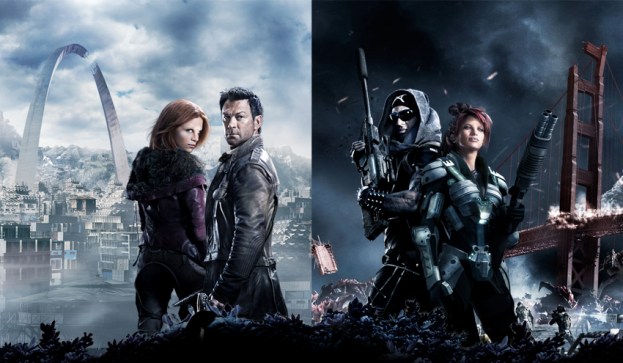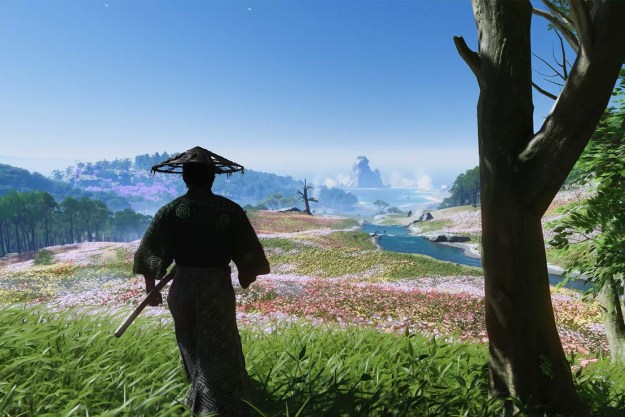
Syfy president Mark Stern has gotten a crash course in video game culture over the past few years. Not only from the cable network’s relationship with THQ on Red Faction, but also a five-years-strong partnership with Trion Worlds that culminates in April with the two-pronged launch of Defiance as both a game and a sci-fi TV series. It’s pure transmedia, a word that buzzes for some and feels dirty to others. It’s a new adventure for Stern, who has worked with Trion for the past half-decade on assembling something that fans of sci-fi – whether gamer, TV-lover, or both – can connect with. This is no small challenge for someone who openly admits to having only a light background in video games.
“I grew up in the era of Pong and arcade games, so my experience with gaming is living vicariously through my son,” Stern told Digital Trends in an interview at the 2013 D.I.C.E. Summit. “I have a teenager. I feel very versed riding side-saddle watching him play every single game, but I’m a complete neophyte when it comes to the intricacies of what makes a great MMO versus not.”
“That’s very scary for me, because I’m completely colorblind when I look at Defiance… I have no idea if it’s a great game or not, except that I trust these guys. They seem to know what they’re doing and they’ve been very truthful and honest. So I’m kind of going on faith.”
That trust seems to be well-placed. Trion is no newcomer to the games space, having impressed most everyone who played its 2011 MMORPG Rift with its imaginative world, top-notch technical execution, and original ideas. Syfy is no stranger to taking chances either, or to throwing support behind ideas that click with some community or another. Stern is very much aware that delivering quality content on television is not as simple as saying ‘Let’s make a series that people will respect,’ and he’s learned from past and current games partnerships that it’s much the same situation in the interactive space.
“I think I’ve gained a real respect for the fact that, like my media, it looks easy from the outside,” Stern explained. “You really realize there’s so much intricacy and expertise. It’s a creative process and it’s iterative like ours is [on TV]. I gained a deep respect for how difficult [game development] really is, that it’s not just polygons and guns. How deeply these guys go in their mythology is really impressive to me.”
The deep-diving mythology serves as the necessary foundation for Defiance‘s transmedia focus. It’s an appealing prospect, something Stern refers to as “a bit of a unicorn.” You’re serving multiple audiences and hopefully hooking some of them into following content across multiple platforms. The trick isn’t creating a mythology and a universe – though there’s plenty of hard work involved there – but rather figuring out how to do it in a way that grows a fan community. Syfy is an ideal home for such an effort, as Stern sees it.

Defiance is the product of a half-decade’s worth of work, with Trion and Syfy splitting up the creative duties between their respective disciplines. So positive were the early days of this relationship that Syfy looked in other directions as well, which led to the partnership with THQ. Feature-length Red Faction: Guerilla tie-in Red Faction: Origins might not have been a monumental success – whether it’s the game’s fault, the movie’s, or the franchise as a whole is another discussion entirely – but important lessons were learned that then carried back over to the Trion partnership.
“Red Faction was really more of a traditional, derivative IP exploration, and I think for us it was a really interesting mythology [for which] we created a narrative to work alongside that. The ambition for that wasn’t nearly what [Defiance] is, and it really wasn’t meant to be,” Stern explained.
“I think we came out of that experience convinced more than ever that we really need to build from the ground up the way we were doing with Defiance,” he continued. “It was incredibly difficult and it was a long road and there were definitely times where we [questioned] if it was going to work. I think on both sides there’s a certain leap of faith that you have to take. That they’re gonna deliver a great game and they know what they’re doing, and I’m sure they felt the same way about us.”
“We came out of the Red Faction experience thinking this isn’t the answer. We really do need to find something that is engineered from the start in its very DNA to live on multiple platforms. It’s really hard, if not impossible, to just do it in one direction.”
It’s hard to say the word “transmedia” without immediately thinking of Star Wars, which really stands as the prototypical example of cross-platform storytelling set within a single, immersive universe. Stern pays plenty of respect to George Lucas and his creation, but he notes as well that examples can be found even there of the challenges that a transmedia effort presents.
“Star Wars is a really immersive, deep, authentic world. Lucas created a mythology that clearly has stood the test of time, that people want to lose themselves in and experience in different ways. They’ve been able to encompass and enable all sorts of storytelling within that world, and yet you’re still true to that original mythology. That’s what we’re trying to accomplish here,” Stern said.
“Whether he set out to do that or not – he probably did, because he’s a genius – what he created was something that was rich enough to enable that. Having said that, there isn’t a [live-action] TV series yet on Star Wars, and I think that you still see where it doesn’t always necessarily easily translate. You have to find a way in. Even the most amazing properties still have their limitations.”
A fundamental component of finding that way in, as Stern sees it, is recognizing that there’s a mainstream level of interest in this approach to entertainment. It’s not quite as surface-level as it is with the hardcore fan community, for Defiance or any other piece of popular sci-fi/fantasy fiction, but it’s there. He cautions against labeling sub-sections of the community or giving too much credit to the niche; without mass appeal, these multi-platform efforts would be a challenge to sustain.
“I think it’s derogatory to consider geek culture niche. This is a mass media genre. Sci-fi, supernatural… you only have to look at the top 10 movies of all times to see that,” he said. “I think it’s part of the human condition to want to live deeply [and] lose yourself in things. Star Wars and Star Trek and all of these giant transmedia properties didn’t become massive hits because of a small group of geeks. They are just the most vocal and obvious example. They’re hits because people are consuming them across the board, whether they self-identify or not. The more you can do it the better. It’s not always going to be right.”
Defiance certainly seems to be aiming to get things right. This is a universe that has been built from the very moment of inception to span multiple mediums. The game and the show both offer different things to different people, but they’re also meant to cross-communicate and, potentially, foster a level of connection that drives fans explore even more deeply. These hooks are essential, and they’re scattered through both the game and the first season of the series.
“Some of it is going to be very subtle, some of it you might only know if you’re a gamer and you’re watching the show,” Stern revealed. “There’s a reference in one of the final episodes to this guy Black Jonah. If I’m a viewer, I just met him, but if I’m a gamer [ I recognize him from the game ]. Those are the kind of easter eggs that are great and you want them paying off.”

“Then there are definitely big events – it was very important as we were designing the first season that we have at least three or four big crossover events. So we have this big virus story and then there are a couple of other stories that I don’t really want to spoil. There are lots and lots of other, subtler plays that interweave just because we’ve got two teams, and they’re working together and playing off of each other. Naturally you’re going to have this cross-pollination in lots of different ways; some story-driven, some character-driven, some aesthetics and set design. It really just goes all over the place.”
The show’s second season would be coupled with a Trion-developed expansion pack, but fans can also count on continuing support while new episodes are in production. “This is where it also gets really exciting: there would be some extension between the end of season one and the beginning of season two within the game. So the mythology lives on. We might be introducing new characters or situations in the game that then come to fruition in the second season. How do we keep the world of the series alive in the game when we’re off the air?”
Stern isn’t ready to talk about what’s ahead, but he doesn’t deny that Syfy already has a creatively rich library of content to draw from for subsequent explorations in the realm of cross-platform entertainment. While he continues to believe that the most effective route to building a transmedia property is to approach it from that perspective at moment one, he admits that there’s still plenty of opportunity in what’s already out there.
“I certainly wouldn’t rule it out, especially if you look at some of the [Syfy content-related] novels out there. There are some huge worlds that have been created that we might go into. I think there’s a further conversation to be had. We certainly would love to work with [Trion] again and we’ve talked about other things that we want to do. It depends on where they want to go next. We’re also now just preliminarily talking about what is season two of Defiance… where we might go, what we’ve learned from all the stuff we just went through. We learned how to drive, now let’s get on the racetrack with it.”


